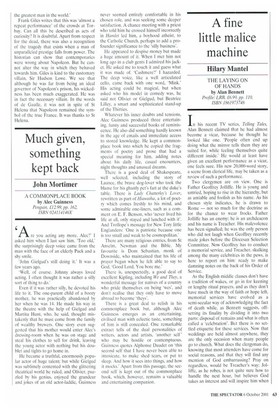Much given, something kept back
John Mortimer
A COMMONPLACE BOOK by Alec Guinness Penguin,112.99, pp. 162. ISBN 024114146X Are you acting any more, Alec?' I asked him when I last saw him. 'Too old,' the surprisingly deep voice came from the man with the face of an elderly Puck and a shy smile.
'John Gielgud's still doing it.' It was a few years ago.
'Well, of course. Johnny always loved acting. I often thought it was rather a silly sort of thing to do.'
Even if it was rather silly, he devoted his life to it, The one-parent child of a boozy mother, he was practically abandoned by her when he was 14. He made his way in the theatre with the help of Gielgud and Martita Hunt, who, he said, thought mistakenly that he must come from the family of wealthy brewers. One story even suggested that his mother would enter Alec's dressing-room when he was on stage and steal his clothes to sell for drink, leaving the young actor with nothing but his doublet and tights to go home in.
He became a truthful, enormously popular actor of huge talent; but while Gielgud was sublimely contented with the glittering theatrical world he ruled, and Olivier, puzzled by his genius, enjoyed the grandeur and jokes of an old actor-laddie, Guinness never seemed entirely comfortable in his chosen role, and was seeking some deeper satisfaction. A chance meeting with a priest who told him he crossed himself incorrectly in Hamlet led him, a boyhood atheist, to the Catholic Church, perhaps to add a profounder significance to the 'silly business'.
He appeared to despise money but made a huge amount of it. When I met him not long ago in a club gents I admired his jacket. He asked me to touch it and guess what it was made of. 'Cashmere?' I hazarded. The deep voice, like a well articulated cello, came back with one word, 'Mink.' His acting could be magical, but when asked who his model in comedy was, he said not Olivier or Gielgud, but Beatrice Lilley, a smart and sophisticated stand-up of the Thirties.
Whatever his inner doubts and tensions, Alec Guinness produced three entertaining, funny and successful books of reminiscence. He also did something hardly known in the age of emails and immediate access to stored knowledge. He kept a commonplace book into which he copied the fragments of poetry and prose that had a special meaning for him, adding notes about his daily life, casual encounters, night thoughts and unusual dreams.
There is a good deal of Shakespeare, well selected, including the story of Launce, the brave dog-lover who took the blame for his ghastly pet's fart at the duke's table. There is Lady Chatterley's Lover, rewritten as part of Hiawatha, a lot of poetry which comes freshly to his mind, and some admirable one-liners, such as a comment on E. F. Benson, who 'never lived his life at all, only stayed and lunched with it'. And Trollope's message for New Tory little Englanders: 'One is patriotic because one is too small and weak to be cosmopolitan.'
There are many religious entries, from St Anselm, Newman and the Bible. My favourite is Dorn Sebastian, monk of Downside, who maintained that his life of prayer began when he felt able to say to God. 'Good Lord, You bore me.'
There is, unexpectedly, a good deal of excellent Kipling. including We and They, a wonderful message for natives of a country who pride themselves on being *es', and don't realise that they only have to move abroad to become `theys'.
There is a great deal to relish in his commonplace book but, although Alec Guinness emerges as an entertaining, civilised man with eclectic taste, something of him is still concealed. One remarkable extract tells of the dual personalities of writers, actors and artists, 'another self' who may be hostile or contemptuous. Guinness quotes Alphonse Daudet on 'this second self that I have never been able to intoxicate, to make shed tears, or put to sleep. And how it sees into things, and how it mocks.' Apart from this passage, the second self is kept out of the commonplace book, which, however, remains a valuable and entertaining companion.


































































































 Previous page
Previous page